|
|
|
Sort Order |
|
|
|
Items / Page
|
|
|
|
|
|
|
| Srl | Item |
| 1 |
ID:
097866


|
|
|
| 2 |
ID:
155520
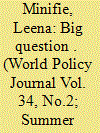

|
|
|
|
|
| Summary/Abstract |
World Policy Journal asked experts from Canada, Kenya, Australia, and Chile how colonialism impedes justice for indigenous peoples.
|
|
|
|
|
|
|
|
|
|
|
|
|
|
|
|
| 3 |
ID:
155525
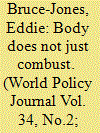

|
|
|
|
|
| Summary/Abstract |
Oury Jalloh, an asylum-seeker from Sierra Leone, burned to death chained to a mattress in a German holding cell. Eddie Bruce-Jones, a senior legal lecturer at University of London’s Birkbeck College School of Law, writes that the myriad mistakes in the investigation and prosecution of Jalloh’s case reveal patterns institutional racism that many Germans are unwilling to confront.
|
|
|
|
|
|
|
|
|
|
|
|
|
|
|
|
| 4 |
ID:
060691


|
|
|
| 5 |
ID:
192181
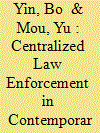

|
|
|
|
|
| Summary/Abstract |
In 2018, China's general secretary, Xi Jinping, announced a three-year war on “black societies and evil forces” and promised to take down various forms of organized crime and evil forces within society. This article examines the operational features of this particular crackdown and how they diverged from previous “strike hard” campaigns. This campaign adopted novel strategies including embedding instructions on law enforcement within criminal justice institutions, promulgating special rules on the crimes of evil forces in order to “strike” campaign targets early, and deploying intrusive investigation tactics that focused on the person and not the crime. Using democratic centralism as a liberal lens, this campaign showcases the struggle between the imperative of legality and the politics of a major campaign in China.
|
|
|
|
|
|
|
|
|
|
|
|
|
|
|
|
| 6 |
ID:
086199
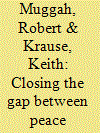

|
|
|
|
|
| Publication |
2009.
|
| Summary/Abstract |
This article highlights how the instruments for addressing the presumed source(s) of armed violence need to be sharpened and extended to address the heterogeneous character of armed violence present in many post-conflict situations. These extensions require the development of practical armed violence prevention and reduction programmes that draw upon scholarship and practice from the criminal justice and public health sectors. The article argues that reducing organized violence and insecurity in post-conflict contexts requires responding to the wider dynamics of armed violence rather than focusing exclusively on insecurity directly connected to what are traditionally defined as armed conflict and post-conflict dynamics; and this requires attention not just to the instruments of violence, but also to the political and economic motives of agents and institutions implicated in violent exchanges at all levels of social interaction.
|
|
|
|
|
|
|
|
|
|
|
|
|
|
|
|
| 7 |
ID:
135845
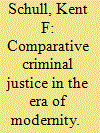

|
|
|
|
|
| Summary/Abstract |
This article lays out the broad transformations within the Ottoman criminal justice system over the course of the nineteenth century in order to demonstrate how the empire transformed its long-standing methods and approaches to criminal justice by adapting “modern” concepts and practices. In the end, it created an integrated system of justice that included new penal codes, police, courts, and corrections, thus demonstrating both its unique characteristics and its comparability with contemporary states. This article first discusses the problematic, but indispensable concept of modernity and how it has hindered comparative empire studies for the long nineteenth century. It then argues for an eclectic approach to comparative empire that adopts the concept of “improvisational blending” to understanding modernity and utilizes intermediate units of analysis in promoting the study of comparative empires. Finally, this article takes the transformation of the Ottoman criminal justice system during the late nineteenth and early twentieth centuries as an intermediate unit of analysis to illustrate a unique Ottoman modernity that is fully comparative on the trans-imperial level.
|
|
|
|
|
|
|
|
|
|
|
|
|
|
|
|
| 8 |
ID:
176486


|
|
|
|
|
| Summary/Abstract |
The article argues that the impact of law enforcement efforts against corruption deserves more scholarly attention. Drawing on a mixed-methods study from Malawi in southern Africa, where a large-scale law enforcement operation has been investigating and prosecuting those involved in a 2013 corruption scandal known as ‘Cashgate’, the article explores the potential for corruption deterrence from the perspective of government officials in the Malawi civil service. Malawi provides a challenging environment for deterrence due to limited state capacity, weak law enforcement agencies and widespread corruption. Nonetheless, the research findings show that Malawian government officials perceive prosecutions and convictions to deter corruption, both with regards to the law enforcement response to Cashgate specifically and law enforcement efforts in general. The findings from Malawi suggest that law enforcement and criminal justice have the potential to make an important contribution to anti-corruption strategies in Africa and the Global South at large.
|
|
|
|
|
|
|
|
|
|
|
|
|
|
|
|
| 9 |
ID:
173213
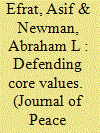

|
|
|
|
|
| Summary/Abstract |
Are states willing to overlook human rights violations to reap the fruits of international cooperation? Existing research suggests that this is often the case: security, diplomatic, or commercial gains may trump human rights abuse by partners. We argue, however, that criminal-justice cooperation might be obstructed when it undermines core values of individual freedoms and human rights, since the breach of these values exposes the cooperating state to domestic political resistance and backlash. To test our argument, we examine extradition: a critical tool for enforcing criminal laws across borders, but one that potentially threatens the rights of surrendered persons, who could face physical abuse, unfair trial, or excessive punishment by the foreign legal system. We find support for our theoretical expectation through statistical analysis of the surrender of fugitives within the European Union as well as surrenders to the United States: greater respect for human rights correlates with the surrender of fewer persons. A case study of Britain confirms that human rights concerns may affect the willingness to extradite. Our findings have important implications for debates on the relationship between human rights and foreign policy as well as the fight against transnational crime.
|
|
|
|
|
|
|
|
|
|
|
|
|
|
|
|
| 10 |
ID:
034499


|
|
|
|
|
| Publication |
Norman, University of Oklahoma Press, 1987.
|
| Description |
xiii, 375p.Hardbound
|
| Standard Number |
0806120509
|
|
|
|
|
|
|
|
|
|
|
|
Copies: C:1/I:0,R:0,Q:0
Circulation
| Accession# | Call# | Current Location | Status | Policy | Location |
| 029323 | 364.9798/HUN 029323 | Main | On Shelf | General | |
|
|
|
|
| 11 |
ID:
155530
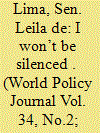

|
|
|
|
|
| Summary/Abstract |
Prison walls cannot prevent Philippine President Rodrigo Duterte’s fiercest foe from speaking out. From her cell, Sen. Leila de Lima calls the 71-year-old ruler a “geriatric dictator wannabe” involved in “mass serialized murder” and says history will vindicate her.
|
|
|
|
|
|
|
|
|
|
|
|
|
|
|
|
| 12 |
ID:
126338
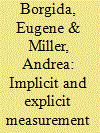

|
|
|
|
|
| Publication |
2013.
|
| Summary/Abstract |
In 2011, more than 3% of all black men in the United States were imprisoned, compared to only 0.5% of all white men. Among prisoners ages 18 to 24, black men were imprisoned at a rate more than seven times that of white men (Carson and Sabol 2012). It is becoming increasingly urgent for researchers to understand what accounts for these race-based disparities. While a broad constellation of social problems exist that likely contribute to these disparities in concert, different fields of social science tend to focus on different types of explanations. Political scientists and sociologists have tended to emphasize the role of institutional factors, including criminal justice policies and practices, in maintaining race-based disparities. Social psychologists, in contrast, have tended to emphasize individual factors, including punitive responses to crime by jurors, judges, and criminal justice professionals.
|
|
|
|
|
|
|
|
|
|
|
|
|
|
|
|
| 13 |
ID:
085826
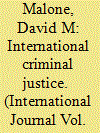

|
|
|
|
|
| Publication |
2008.
|
| Summary/Abstract |
July 2008 produced two major developments relating to international criminal justice, highlighting again the political delicacy of this newly salient dimension of international relations. On 14 July, the prosecutor of the international criminal court sought an arrest warrant against serving Sudanese President Omar al-Bashir for genocide, crimes against humanity, and murder.
|
|
|
|
|
|
|
|
|
|
|
|
|
|
|
|
| 14 |
ID:
108280


|
|
|
| 15 |
ID:
155522


|
|
|
|
|
| Summary/Abstract |
The Egyptian government has repeatedly violated the law with arbitrary arrests, torture in detention, and forced disappearances. But in the past, Egyptian legal expert Mai El-Sadany says, at least these measures could have been challenged in court. Today a person may be subjected to the same abuses without recourse or appeal.
|
|
|
|
|
|
|
|
|
|
|
|
|
|
|
|
| 16 |
ID:
174125
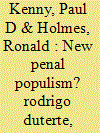

|
|
|
|
|
| Summary/Abstract |
Drawing on evidence from the Philippines, this paper investigates the so-called penal populism thesis. Penal populism refers to an understanding of justice in which criminal and anti-social activity should be harshly punished. The paper tests whether support for harsh penal policies, including the use of extrajudicial killings, is associated with underlying populist attitudes and preferences for charismatic leadership. Since coming to power in 2016, President Rodrigo Duterte has waged a violent and highly popular campaign against drug-related criminality. Based on survey modules fielded in 2016 and 2017, the paper demonstrates a positive relationship between populist attitudes and support for the campaign against illegal drugs in general and the extra-judicial killing of suspected drug users and dealers in particular. It also demonstrates a relationship between belief in the charisma of Duterte and support for the campaign against illegal drugs. The implications of the theory and results for the fields of populism and penal populism research are discussed.
|
|
|
|
|
|
|
|
|
|
|
|
|
|
|
|
| 17 |
ID:
054217


|
|
|
|
|
| Publication |
Jul-Sep 2004.
|
|
|
|
|
|
|
|
|
|
|
|
|
|
|
|
| 18 |
ID:
077229
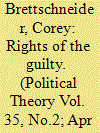

|
|
|
|
|
| Publication |
2007.
|
| Summary/Abstract |
In this essay I develop and defend a theory of state punishment within a wider conception of political legitimacy. While many moral theories of punishment focus on what is deserved by criminals, I theorize punishment within the specific context of the state's relationship to its citizens. Central to my account is Rawls's "liberal principle of legitimacy," which requires that all state coercion be justifiable to all citizens. I extend this idea to the justification of political coercion to criminals qua citizens. I argue that the liberal principle of legitimacy implicitly requires states to respect the basic political rights of those who are guilty of committing crimes, thus prohibiting capital punishment.
|
|
|
|
|
|
|
|
|
|
|
|
|
|
|
|
| 19 |
ID:
186347
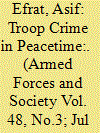

|
|
|
|
|
| Summary/Abstract |
U.S. forces abroad have often faced complaints about crimes committed by troops, yet we lack systematic quantitative information on such crimes. Based on newly discovered data compiled by the Army, this article presents a comprehensive and detailed picture of American troops’ criminal activity worldwide during the Cold War (1954–1970). The data show that troops engaged in significant criminality, with a particularly high rate of violent crime—homicide, rape, and robbery—and a relatively low rate of property crime. Host countries treated offending troops leniently: Prison sentences were rare, and they averaged less than 2 years in duration. The data presented here hold far-reaching implications for our understanding of the relations between U.S. forces and host countries and the legacy of U.S. military deployments.
|
|
|
|
|
|
|
|
|
|
|
|
|
|
|
|
| 20 |
ID:
146510
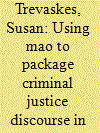

|
|
|
|
|
| Summary/Abstract |
“Strike hard” anti-crime campaigns, “harmonious justice” and “stability maintenance” are the three key politically inspired agendas of crime control and punishment in 21st-century China. This paper is a study of how discourse has helped to package these agendas and to mobilize politico-legal functionaries into action. It examines discourse in the first weeks of the 2014 “people's war on terror” and the agendas of “harmonious justice” and “stability maintenance” in the Hu Jintao era. It finds that each has been rationalized and shaped by an understanding of the utility of punishment based on Mao's utilitarian dialectics. The political virtuosity of Mao's dialectics is that it can be adapted to suit any political situation. In understanding how Mao connects with criminal justice in China today, this paper identifies what is the “political” in “politico-legal” discourse in the fight against crime in the 21st century.
|
|
|
|
|
|
|
|
|
|
|
|
|
|
|
|
|
|
|
|
|